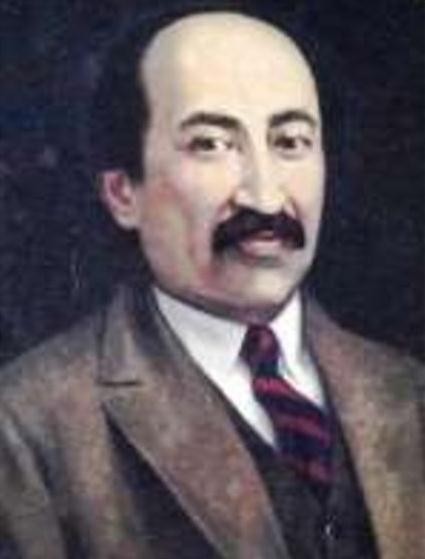
|
|
|
|
|
|||
|
|
한국인
|
日本
|
Abdurauf Fitrat plays an important role in the history of our literature as a poet and scientist, prose writer and playwright, teacher and enlightener. He was born in 1886 in Bukhara in an educated family and studied at madrasas and dorilfuns in Bukhara and Istanbul. Due to his perfect knowledge of Arabic, Persian and Turkish, he mastered the works of the great scholars of the East. The writer's father was a trader and remained in Kashgar until 1918. He was mainly brought up by his mother Mustafa Bibi (Bibijon), from whom he first listened to the poems of such great poets as Navoi, Uvaysi, Zebunniso, Bedil, Fuzuli. Fitrat went to Turkey to study in 1909 and studied at the Istanbul Medical University until 1913.
He was active in the Bukhara Education Association, which was established in Turkey. Behbudi contributed to the improvement of the Jadid schools.
His first collection was published in 1911 under the name "Sayha" ("Chorlov"). "Indian tourist"
His works, such as Debate, were also published in those years. While studying at the Turkish Medical University in 1909-1913, his ingenuity and knowledge amazed the professors and teachers.
He is nicknamed Fitrat-Donishmand. Fitrat's work dates back to the period when the revolutionary movement in Turkestan was intensifying and the East was awakening. He, like his predecessors, promotes the ideas of enlightenment in the first place. In his Tajik-language work Munozara, written in 1913, he seems to have sought a "way of salvation" by rescuing his people from the mire of oppression. During this period, the promotion of the Russian language and Russian culture was also an important branch of the enlightenment of Fitrat. In the same years he came out with the slogan "The first issue on the path of life is the issue of school" (Hürriyet, 1917, No. 1). Published in his newspaper Hürriyet (1917, No. 31)
In the film "Yurt kaygusi ..." he says that for Turkestan, his women are determined to fight for their freedom. “I was born for you, I live for you, I die for you, oh
the sacred hearth of the species! ” the call is heard. In the newspaper "Great Turkestan" (1917, No. 2)
It comes out with the slogan "Long live Turkism, long live Islam". His works such as "Indian Controversies", "Timur's Right", "Oguzkhan", "Abo Muslim", "Turkish Language" also contain ideas. Among them are "Blood", "Begijon", "True Love", "Wave", "Vose Uprising",
Drama such as "Fasting" was created. Fitrat's poems, such as "Yesterday", "In Search of Behbudi's Tomb", and "Sharq", included in the collection of "Uzbek poets" published in 1922, are in the process of research.
In the poem "The Poet" he concludes that "I have made many hopes for myself." In his poem "Kim deyay seni" written in 1920, the lover's aspirations, expectations and love for the lover are sung in a lyrical tone, which indicates that the poet is now rising to a new level of creativity. There is a shift in the poet's work, worldview, the desire for innovation and beauty. The same is true of his dramas such as "Abulfayzkhan", "Arslan" and "Vose" (in Tajik). His prose works, such as "Doomsday", "Satan's Rebellion against God", now show a deepening of the creative philosophy, the desire to solve major social problems. As a great scholar and literary critic, Fitrat also created many works. Including,
Scientific observations such as "Rules of literature", "Samples of old Uzbek literature", "About Aruz" play an important role in the history of literary criticism. His researches on Umar Khayyam, Firdavsi, Navoi, Bedil, M. Salih, Muqimi, Furkat will undoubtedly serve as an important source in the study of the history of our literature. Ahmad Yassavi has written articles about more than a dozen representatives of classical literature, such as Suleiman Bagirgani. At the same time, Fitrat was an active scientist, a great teacher, and an organizer of public education. From 1921 to 1923 he served as People's Minister of Education of the Republic. From 1923 to 1924 he lectured at the Institute of Oriental Languages in Moscow, and then at the St. Petersburg Medical University. The textbook "Uzbek language" and the book "Uzbek language consumption" (grammar) were published five times in 1925-1930. His "Our language", "Uzbek language lessons",
Articles "On the occasion of the spelling conference" were also created. He was one of the first Uzbek scientists to be awarded the title of professor. Fitrat was executed on October 4, 1938 among the great intellectuals of our people, such as Abdullah Qodiri, Cholpon, Otajon Hashim, Qayum Rhamazon, Ghazi Alim. It was not until 1956 that he was acquitted. It was justified, and only after another thirty-five years, thanks to the period of independence, was it possible to tell and write the truth about him. Abdurauf Fitrat's life and literary activity are rich in contradictions. On September 25, 1991, Abdurauf Fitrat was awarded the Alisher Navoi Republican State Prize for his contribution to the development of Uzbek drama, realistic literary criticism and the establishment of a school of literary criticism.